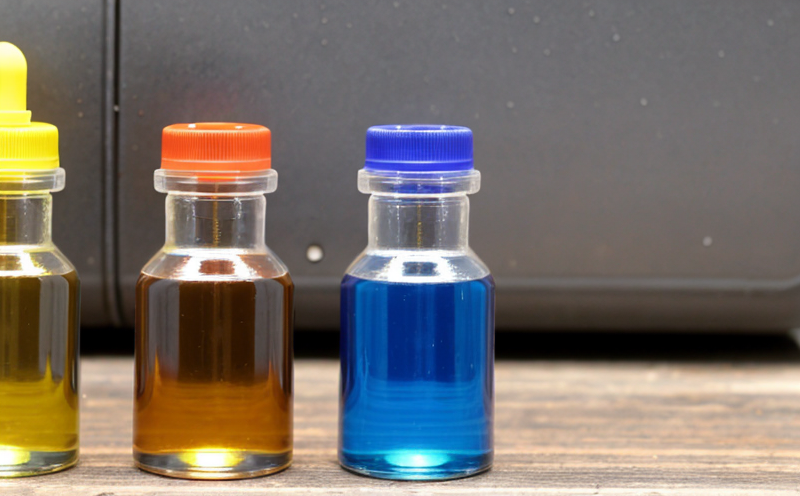Olive Oil Acid Value Testing
The acid value of olive oil is a critical parameter that reflects its quality and freshness. It provides insight into the level of free fatty acids present in the oil, which can indicate the extent to which the oil has undergone oxidation or rancidity.
Acid value testing is especially important for olive oil as it helps ensure that the product meets international standards such as ISO 3974 and EU regulations. This test ensures consumer safety by preventing the consumption of oils that may be harmful due to high levels of free fatty acids.
The process involves titrating a known amount of olive oil with standard potassium hydroxide solution until neutralization is achieved, typically using phenolphthalein as an indicator. The amount of KOH required for this reaction directly correlates with the acid value and provides a quantitative measure of the oil’s freshness.
Our laboratory utilizes advanced analytical techniques to ensure precision and accuracy in our testing methods. We follow ISO 3974-1:2016, which outlines standard procedures for determining the free fatty acids content in oils by titration method.
The importance of this test cannot be overstated, particularly in global trade where olive oil is a key commodity. Many countries have stringent regulations governing the acid value limits to ensure that imported products meet local standards and consumer expectations.
Understanding the acid value also plays a crucial role in the production process. For instance, it can help determine when an oil has reached its optimal point of extraction or when additional refining steps are necessary. This information is invaluable for quality managers looking to optimize their production processes and ensure compliance with international standards.
Our comprehensive approach includes not only the testing itself but also providing detailed reports that outline the results, including comparisons against industry benchmarks and recommendations for further actions if needed. This service is particularly beneficial for procurement officers who need to verify the quality of olive oil before finalizing contracts or for R&D engineers looking to refine their processes.
By offering this service, we contribute significantly to maintaining the integrity of the olive oil market globally. Our commitment to accuracy and adherence to international standards ensures that consumers receive high-quality products that meet stringent regulatory requirements. This testing is not just a compliance exercise but a vital part of ensuring the reputation and trustworthiness of brands in the olive oil industry.
International Acceptance and Recognition
- ISO 3974-1:2016 - This standard is widely recognized for its accuracy in determining the free fatty acids content of oils by titration, making it a preferred method globally.
- American Oil Chemists Society (AOCS) - AOCS standards are often used alongside ISO to ensure consistency and reliability in olive oil testing procedures.
- European Union Regulations - EU regulations set specific limits on the acid value of olive oils, particularly extra virgin olive oil, which must not exceed 0.8 g KOH/100g.
- International Olive Council (IOC) - The IOC provides guidelines that are widely accepted and followed by both producers and importers to ensure compliance with international standards.
Environmental and Sustainability Contributions
In the context of olive oil production, ensuring the quality through rigorous testing like acid value analysis is not only beneficial for consumer health but also contributes positively to environmental sustainability. By maintaining high standards in olive oil production, we help reduce waste from substandard products and promote more sustainable agricultural practices.
Our laboratory’s role extends beyond just testing; it supports the broader goal of sustainable agriculture by ensuring that producers meet international standards which can lead to better crop management practices. This, in turn, reduces environmental impact through efficient use of resources and minimizing waste.
The precision and reliability of our acid value testing contribute directly to these sustainability efforts. By providing accurate data on the quality of olive oil, we assist producers in making informed decisions that can lead to more sustainable farming practices. This includes optimizing harvesting times, selecting appropriate varieties, and implementing efficient processing techniques.
Competitive Advantage and Market Impact
For quality managers and compliance officers within the olive oil industry, ensuring that their products meet international standards is crucial for maintaining a competitive edge in the global market. Our acid value testing service not only ensures compliance but also provides valuable insights into the quality of each batch of olive oil.
By offering this service, we help companies differentiate themselves by demonstrating a commitment to excellence and reliability. This can enhance brand reputation and consumer trust, which are paramount in building long-term customer relationships. For R&D engineers, our service offers a valuable tool for refining production processes and optimizing the quality of their products.
In terms of market impact, accurate acid value testing ensures that olive oil meets the stringent requirements set by various regulatory bodies worldwide. This not only prevents substandard products from entering the market but also helps to maintain high standards across the industry. For procurement officers, this service is essential for verifying the quality and consistency of their suppliers' products.
Ultimately, our acid value testing service contributes to a more transparent and reliable olive oil market, which benefits all stakeholders involved. By ensuring compliance with international standards, we help maintain consumer confidence in the product and support sustainable practices that benefit both producers and consumers alike.





